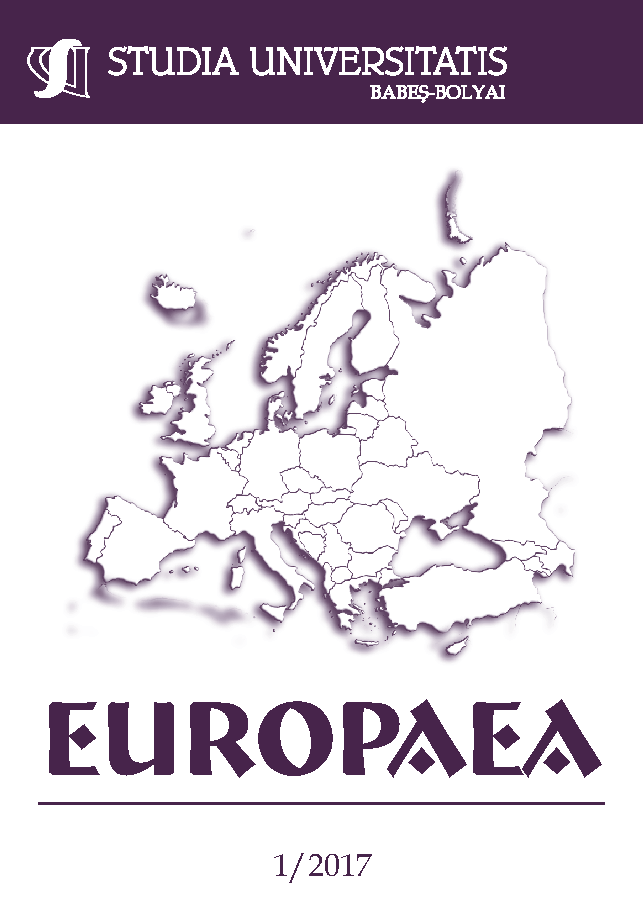REFORMES ÉLECTORALES EN CROATIE ET MINORITE NATIONALE SERBE (1990-2002)
DOI:
https://doi.org/10.24193/subbeuropaea.2017.1.09Keywords:
Electoral reforms – Theories – Ethnic minorities – Croatia – SerbsAbstract
Croatian Electoral Reforms and the Serbian Ethnic Minority (1990-2002). This paper intends to put forward an analytical frame able to explain the complexity of the process leading to electoral reforms in Croatia. The Croatian situation, especially from 1990 to 2002, presents specific features regarding the link between electoral reforms and the Serbian ethnic minority. We will first analyze the electoral reforms through the classical rational choice approach. We will then study them using the modern approach wich acknowledges the variety of political actors and interests and takes into account the historical and geopolitical context.
References
Ouvrages:
Birch, Sarah; Millard, Francis; Popescu, Marina; Williams, Kieran (2002), Embodying democracy: electoral system design in post-Communist Europe, Houndmills, Basingstoke, Hampshire: Palgrave Macmillan (One Europe or several?).
Duverger, Maurice (1951), Les partis politiques, Paris: Armand Colin (Sciences politiques).
Elster, Jon; Offe, Claus; Preuss, Ulrich K. (1998), Institutional design in post-communist societies: rebuilding the ship at sea, Cambridge: Cambridge University Press (Theories of instiutional design).
Horowitz, Donald L. (1985), Ethnic groups in conflict, Berkeley, Los Angeles, London: University of California Press.
Katz, Richard S (1997), Democracy and elections, Oxford: Oxford University Press.
Kitschelt, Herbert; Mansfeldova, Zdenka; Markowski, Radoslaw; Toka, Gabor (1999), Post-communist party systems: competition, representation, and interparty cooperation, Cambridge: Cambridge University Press.
Lijphart, Arend (1994), Electoral systems and party systems: a study of twenty-seven democracies, 1945-1990, Oxford: Oxford University Press, (Comparative European politics).
Linz, Juan Jose (2006 [1966]), Régimes totalitaires et autoritaires, Paris: Armand Colin.
Renwick, Alan (2010), The politics of electoral reform: changing the rules of democracy, Cambridge : Cambridge University Press.
Rokkan, Stein (1970), Citizens, elections, parties : approaches to the comparative study of the processes of development, Oslo: Univesitetsforlaget.
Sartori, Giovanni (1976), Parties and party systems : a framework for analysis, Cambridge : Cambridge University Press.
Tsebelis, George (1990), Nested games: rational choice in comparative politics, Berkeley: University of California Press.
Articles d’ouvrage:
Geddes, Barbara (1996), « Initiation of New Democratic Institutions in Eastern Europe and Latin America », in Lijphart, Arend; Waisman, Carlos H. (Eds), Institutional Design in New Democracies: Eastern Europe and Latin America, Oxford : Westview Press, 14-52.
Vrčan, Srđan (1995), « Izbori 90-93 izmeću demokratizacije i tehnologije vladanja » (The 90, 92 and 93 Élections in Croatia Amidst Tension Between Democratization and Power Technology), in Vrčan Srđan et al. (eds.), Pohod na glasace (Hunt on Voters), Split: Pul, 139-202.
Zakošek, Nenad (1997), « Political Parties and the Party System in Croatia », in Šiber, Ivan (éd.), Founding Elections in Eastern Europe. The 1990 and 1992/93 Sabor Elections in Croatia. Analyses, Documents and Data, Berlin : Éditions Sigma, 34-49.
Articles de revue:
Bawn, Kathleen, « The Logic of Institutional Preferences: German Electoral Law as a Social Choice Outcome » in American Journal of Political Science n°4, Vol. 37, 965-989.
Benoit, Kenneth (2007), « Electoral Law as Political Consequences: Explaining the Origins and Change of Electoral Institutions » in Annual Review of Political Science 10:363, 363-390.
Benoit, Kenneth (2004), « Models of Electoral System Change » in Electoral Studies 23, 363-389.
Boix, Carles, « Setting the Rules of the Game: The choice of Electoral Systems in Advence Democracies » in American Political Science Review n°3, Vol. 93, 609-624.
Bowler, Shaun ; Donovan, Todd ; Karp, Jeffrey (2006) « Why Politicians Like Electoral Institutions: Self-interest, Values or Ideology? » in Journal of Politics n°2, Vol. 68, 434-446.
Commission de Venise, CDL(99)41, in Garonne, Pierre (2001), « Le patrimoine électoral européen. Une décennie d'expérience de la Commission de Venise dans le domaine électoral » in Revue Droit public n°5, 1417-1454.
Dunleavy, Patrick; Margetts, Helen (1995) « Understanding the Dynamics of Electoral Reform » in International Political Science Review 16 (1), 9-29.
Engelbrekt, Kjell (1991), « The Grand National Assembly to Adopt a New Constitution » in RFE/RL Report on Eastern Europe, 5-8.
Garrone, Pierre (2001), « Le patrimoine électoral européen. Une décennie d’expérience de la Commission de Venise dans le domaine électoral » in Revue Droit public n°5, 1417-1454.
Gelazis, Nida (1995), « Lithuanian Elections to the Seimas », unpublished paper, in Bennoit, Kenneth (2004), « Models of Electoral System Change » in Electoral Studies 23, 363-389.
Lalović, Dragutin (2000), « Crisis of the Croatian Second Republic (1990-1999): Transition to Totalitarianism or to Democracy? » in Politička misao n°5, Vol. XXXVII, 47-60.
Leyenaar, Monique; Hazan, Reuven (2011), « Reconceptualising Electoral Reform » in West European Politics 34:3, 437-455.
Lijphart, Arend (1992), « Democratization and constitutional choices in Czecho-Slovakia, Hungary and Poland 1989-1991 » in Journal of Theoretical Politics 4 (2), 207-223.
Mrđen, Snježana (1992), « L'illusion immobile : élections en Yougoslavie (1920-1990) » in Espaces Temps 49-50.
Nikolenyi, Csaba (2011), « When Electoral Reform Fails: The Stability of Proportional Representation in Post-Communist Democracies » in West European Politics 34:3, 607-625.
Pilet, Jean-Benoît (2008), « Les nouveaux souffles de l'analyse des systèmes électoraux » in Revue française de Science politique n°1, Vol. 58, 141-147.
Pilet, Jean-Benoît ; De Waele, Jean-Michel (2007), « Electoral Reform in Romania. Toward a Majoritarian Electoral System » in European Electoral Studies n°1, Vol. 2, 63-79.
Rahat, Gideon (2011), « The Politics of Electoral Reform: The State of Research » in Journal of Elections, Public Opinion & Parties 21:4, 523-543.
Renwick, Alan (2011), « Electoral Reform in Europe Since 1945 » in West European Politics 34:3, 456-477.
Ressources informatiques:
Elections parlementaires du 2 août 1992, [http://www.ipu.org/parline-f/reports/arc/1077_92.htm], 15 mai 2015.
Loi constitutionnelle sur les droits des minorités nationales du 19 décembre 2002 [http://www.axl.cefan.ulaval.ca/europe/croatie-loi_const-2002.htm], 14 mai 2015.
Conseil de l’Europe (23 mars 1999), Respect des obligations et engagements de la Croatie, [http://www.assembly.coe.int/nw/xml/XRef/X2H-Xref-ViewHTML.asp?FileID=8687&lang=fr], 24 mars 2016.
Recensement de 1991, [http://www.axl.cefan.ulaval.ca/europe/croatieinfos.htm], 15 mai 2015.
Journaux:
Le Monde (2 octobre 1990).
Danas (5 juin 1990).
Downloads
Published
How to Cite
Issue
Section
License
Copyright (c) 2017 Studia Universitatis Babeș-Bolyai Europaea

This work is licensed under a Creative Commons Attribution-NonCommercial-NoDerivatives 4.0 International License.



